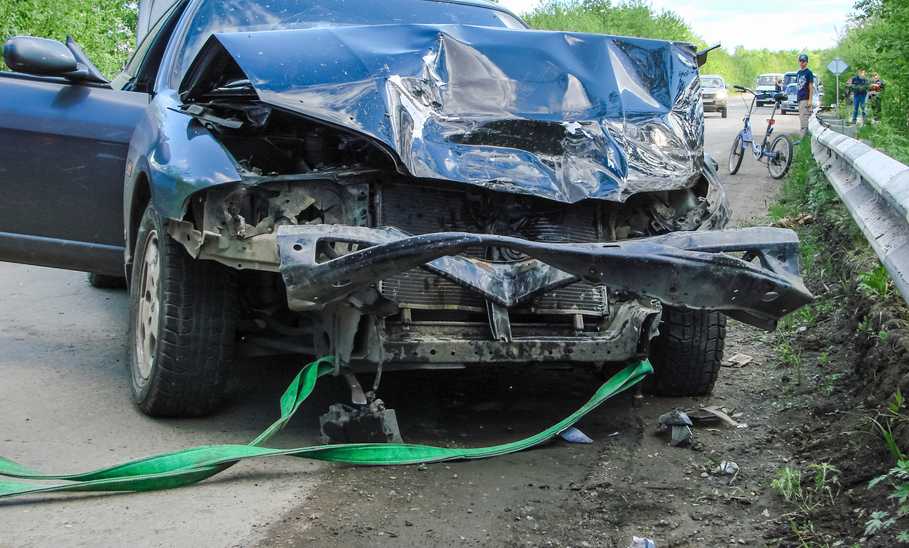Rebuilt Title vs. Salvage Title: Key Differences

Our evaluations and opinions are not influenced by our advertising relationships, but we may earn a commission from our partners’ links. This content is created by TIME Stamped, under TIME’s direction and produced in accordance with TIME’s editorial guidelines and overseen by TIME’s editorial staff. Learn more about it.
Every used car buyer’s worst nightmare is forking over a substantial amount of money only to find that they’ve driven home a set of wheels with hidden damage. One of the best ways to avoid that situation is to check the car’s title before agreeing to the purchase.
Most vehicles available for sale have a clean title, which is a good sign. However, some have a salvage title or rebuilt title, which indicates a troubled past. Here’s what you should know before pursuing a vehicle with either type of document.
A title is a state-issued document that indicates ownership of the vehicle by an individual or a legal entity. The majority of cars available on dealer lots or through private sales have a clean title, which indicates that the car has never been declared a total loss by any car insurance company.
However, if the car has been in a major accident or weather event, the insurance company has to report it to the state. The threshold varies by state, although many require reporting if the repair costs would exceed 75% of the vehicle’s market value prior to the incident. If that condition is met, the state would perform a salvage exam and change the car’s clean title to a salvage title.
Crucially, a car with a salvage title is not able to be driven legally on the street. These cars typically require significant repairs before they can pass the state’s safety inspection.
You can purchase a vehicle with a salvage title, but you have to be able to put in significant work to get the car in proper working condition—which can be a time-consuming and costly endeavor. This is why these vehicles typically sell for a fraction of the price you would pay for a well-maintained car with a clean title.
Once a car with a salvage title has been restored to the point where it’s safe to drive, the owner can apply for a rebuilt title through the state. The exact process for obtaining that change in status varies depending on where you live. However, it typically involves filling out the required paperwork, passing a state safety inspection, and paying the necessary fees.
Unlike a car with a salvage title, one that has a rebuilt title—or “rebuilt salvage” title, as it’s known in some states—can be driven legally on public streets. It may not provide the same assurance that you’d feel from a clean title, but at least you know that it has passed a state inspection.
While the state motor vehicle department issues car titles, it’s the role of the insurance company to change a clean title to a salvage title when a car has experienced substantial damage. This happens when an individual files a valid claim against the policy, and the insurer finds that the cost of repairs would exceed at least 75% of the car’s current value—that is, the car has been “totaled.” The insurer would then notify the state and request for the title to be modified.
Once a vehicle receives a salvage title, it typically needs a considerable amount of repairs before it can be driven again legally. Once completed, the car’s owner has to apply for a rebuilt title through the motor vehicle department. Most states require you to send in the salvage title along with the required form to change the title status.
Depending on where you live, the car will have to go through a complete safety inspection by the state police or a state-certified inspector to ensure that it’s suitable for driving on public roads. The cost of the inspection can vary from state to state, but usually it’s about $200.
Note that in most cases only the state that issued the salvage title is capable of changing its status. For example, if you live in Maryland and bought a vehicle from a seller in Virginia, only the Commonwealth of Virginia can issue a rebuilt title.
A car that has been rebuilt after sustaining serious damage is always going to have more question marks than a car that’s not experienced accidents and floods. While passing a state inspection is helpful, these exams aren’t foolproof. A buyer is always going to wonder whether the person or shop reconditioning the vehicle used high-quality parts and performed the repairs meticulously.
It stands to reason, then, that cars with a rebuilt title generally sell for substantially less than those with a clean title. According to Kelley Blue Book, cars that were once salvaged generally sell for 20% to 40% less than fair market value.
Needless to say, not all restoration jobs are done with equal care. To determine the value of a specific rebuilt car, you should have it analyzed by a reputable, independent mechanic.
Some of the major car insurers will cover vehicles with a rebuilt title. Of those that do, most only offer liability coverage. This is a type of policy, required by most states, that protects other parties if you’re at fault in an accident.
A few carriers offer full coverage for rebuilt cars, although there may be extra strings attached. For example, the insurer may only extend coverage if you obtain a letter from a certified mechanic affirming that the car is safe to drive.
Drivers who do manage to obtain comprehensive insurance on a rebuilt vehicle often pay more than for one with a clean title. However, if they can only get liability coverage, it is generally less expensive than comprehensive coverage, which includes collision coverage. The downside is that you’re more financially vulnerable if you get into an accident and you’re at fault.
If rebuilt cars have one advantage, it’s price. Because they tend to sell for considerably less than other vehicles, they may allow you to purchase a model you normally wouldn’t be able to afford.
Of course, buying a car that has been overhauled also carries significant risks. Before moving forward, be sure you weigh these potential downsides:
Ultimately, the decision comes down to how confident you are in your mechanic’s opinion when they inspect the car and whether you have sufficient cash in reserve for potential maintenance.
A car that was once considered a total loss and received a salvage title may still have some life left. If you or a mechanic refurbishes the vehicle, you can apply to get a rebuilt title instead. If you’re a potential buyer of a rebuilt car, you may think it’s a great deal. Just be aware of the risks and do your due diligence before you decide.
The requirement to change a salvage title to a rebuilt title varies somewhat from state to state. At minimum the state will require you to fill out an application and have the vehicle pass an inspection to prove that it’s road-ready. The inspection itself often costs $100 or more.
In many states a car receives a salvage title when the cost of repairs exceeds 75% of its pre-damage value. The owner can have it changed to a rebuilt title if it’s been fixed and passes a state inspection, which means it’s legal to drive it on the road.
Rebuilt cars can look like a great deal because they tend to sell from 20% to 40% below the price of comparable models with a clean title. Still, given the extensive after-market work that’s been done to them, there’s always a risk that they’ll require more maintenance than cars with a more pristine record. It can also be more difficult to obtain full insurance coverage or get a loan.
Buying a car with a rebuilt title always involves more financial danger because it signifies that the vehicle experienced extensive damage at some point in its life. You can mitigate the risk somewhat by having a trusted mechanic perform an inspection.
Also consider the cause of the damage when deciding to make a purchase. For example, you might be okay with a car that sustained damage to its exterior because of a hailstorm or a fallen tree, as long as the repairs were done properly. However, a car that was in a major accident and needed extensive work on mechanical components can be a dicier proposition.
The same is true of cars that have been in a flood, which may not become a problem for months or years down the line. Carfax offers a free flood check that shows the possibility of flood damage based on weather events where the car has been registered. Unfortunately, it’s not foolproof. According to Consumer Reports, a more reliable test is having a trusted mechanic check for signs of flood damage, such as a musty smell, a water line encircling the engine compartment, or rust underneath the dash and around the doors.
The information presented here is created by TIME Stamped and overseen by TIME editorial staff. To learn more, see our About Us page.



